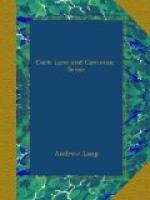A curious piece of traditional folklore came out, but only as hearsay, in court. M. Cheval, Maire of Cideville, deposed that a M. Savoye told him that Thorel had once been shepherd to a M. Tricot. At that time Thorel said to one of two persons in his company: ’Every time I strike my cabin (a shelter on wheels used by shepherds) you will fall,’ and, at each stroke, the victim felt something seize his throat, and fell! {279b} This anecdote is curious, because in the Proceedings of the Society for Psychical Research is a long paper by Dr. Gibotteau, on his experiments with a hospital nurse called Berthe. This woman, according to the doctor, had the power of making him see hallucinations, of a nature more or less horrible, from a distance. She had been taught some traditional feats of rural sorcery, among others that of making a man stumble, or fall, as he walked. The doctor does not make any allusion to the Cideville affair, and it seems probable that this trick is part of the peasant’s magical repertoire, or, rather, that the peasant warlocks boast of being able to perform the trick. But, if we can accept the physician’s evidence, as ‘true for him,’ at least, then a person like Berthe really might affect, from a distance, a boy like Lemonier with a haunting hallucination. To do this is witchcraft, and for crimes of this kind, or on false charges of this kind, poor Mrs. Bishop was burned at Salem in 1692.
At the lowest, we have all the notes of sorcery as our rude ancestors knew it, in this modern affair. Two hundred years earlier, Thorel would have been burned, and G., too, probably, for the Maire of Cideville swore that before the disturbances, and three weeks after G. was let out of prison, Thorel had warned him of the trouble which G. would bring on the cure. Meanwhile the evidence shows no conscious malignity on the part of the two boys. They at first took very little notice of the raps, attributing the noises to mice. Not till the sounds increased, and showed intelligence, as by drumming tunes, did the lads concern themselves, much about the matter. At no time (it seems) did they ask to be sent home, and, of course, to be relieved from their lessons and sent home would be their motive, if they practised a fraud. We may admit that, from rural tradition, the boys might have learned what the customary phenomena are, knocks, raps, moving tables, heavy objects sailing tranquilly about a room. It would be less easy for them to produce these phenomena, nor did the people of all classes who flocked to Cideville detect any imposture.
A land surveyor swore that the raps went on when he had placed the boy in an attitude which made fraud (in his opinion) impossible. A gentleman M. de B. ‘took all possible precautions’ but, nevertheless, was entertained by ’a noise which performed the tunes demanded’. He could discover no cause of the noise. M. Huet, touching a table with his finger, received responsive raps,




